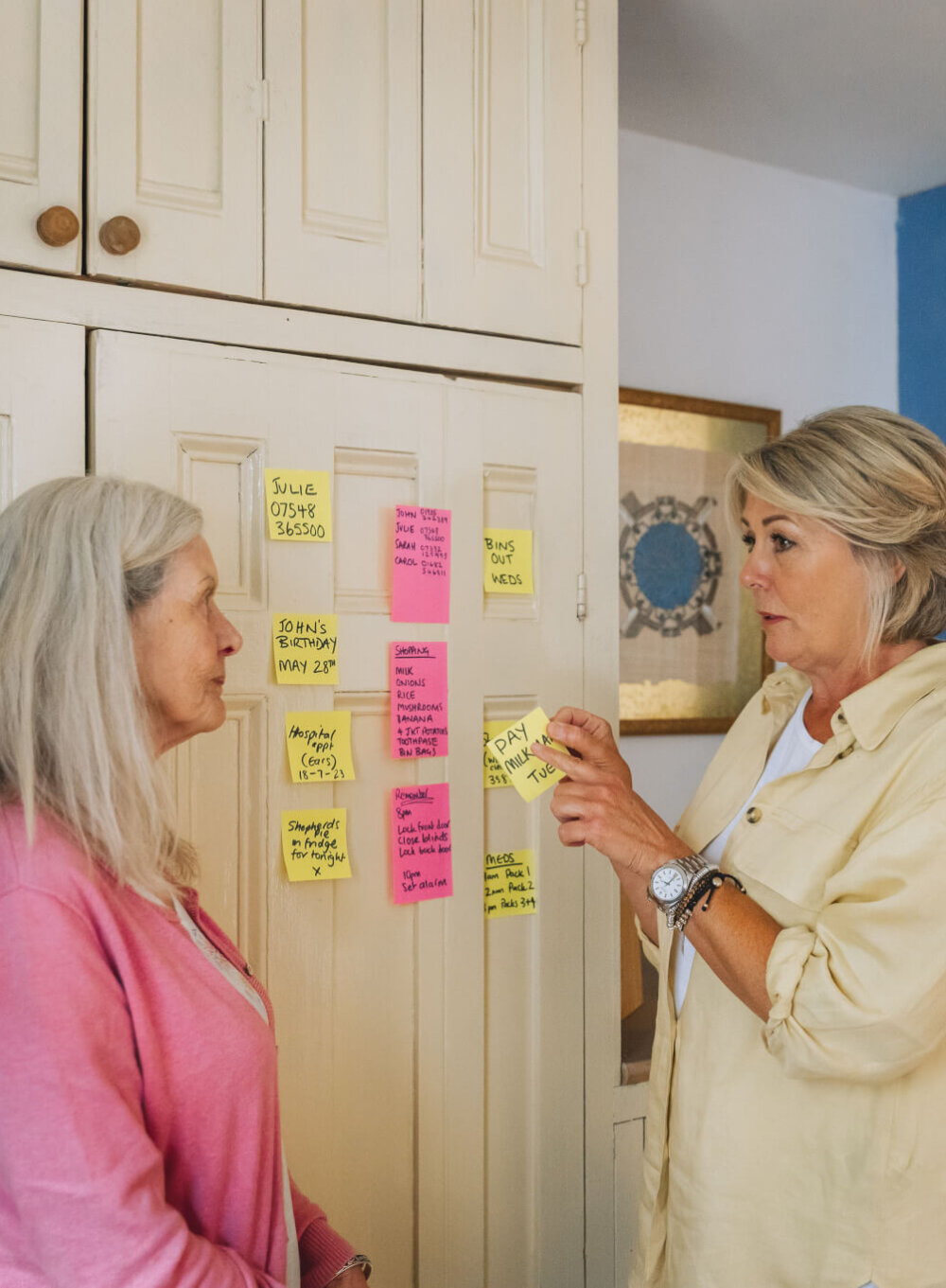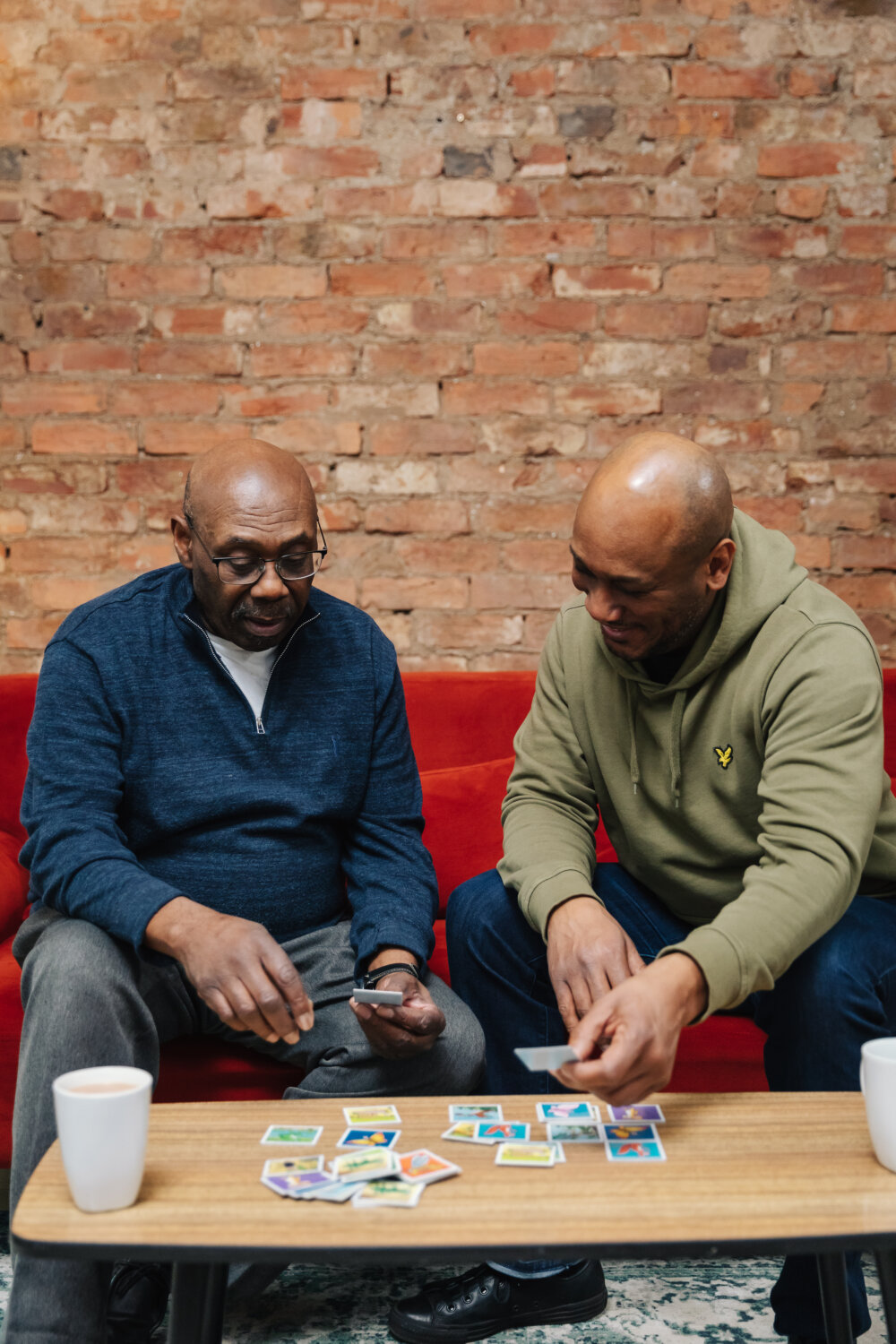The different types of dementia
Learn more about the various types of dementia and the key differences between them.

Dementia is an umbrella term that refers to a number of different conditions, all of which can impair cognitive function. The causes, symptoms and outlook for those with dementia will depend largely on the individual, but could also be impacted by the specific type of dementia they have. To help you understand more about this condition, we are breaking down the different types of dementia there are, what sets them apart from each other, more rare kinds you may come across, how diagnosis works, and more. At Home Instead, our aim is to help people age positively and in place by bringing expert care to their home. For nearly 20 years, we have been providing the highest standard of care, and creating industry-leading training programmes for our Care Professionals that are accredited by nursing and medical professionals. Today, we are the world’s largest global home care network, supporting over 100,000 older adults with personalised, tailored care at home. So whatever questions you have about dementia care, we can help.
What is dementia?
Dementia refers to a range of medical conditions with symptoms involving impaired cognitive function. Dementia conditions are caused by a disruption or damage to neurons in the brain and their connections, meaning messages cannot be sent efficiently around the brain. Symptoms can include things like memory loss, impaired communication, affected decision making, mood and personality changes, and more. You will find more in-depth information about dementia and its symptoms in our dedicated article: What Is Dementia?

What are the most common types of dementia?
There are several types of dementia, with the following being the most common in the UK. 1. Alzheimer’s disease
- How common? Alzheimer’s is the most common type of dementia, affecting around 6 in 10 people with dementia in the UK.
- Cause: While the exact cause is unknown, a buildup of proteins in the brain is thought to form plaques and tangles, reducing essential brain chemicals and shrinking certain brain areas over time.
- Symptoms: Can include memory loss, communication difficulties, changes in perception, mood shifts and problems with reasoning. Learn more in our article: What Is Alzheimer’s?
- How common? This is the second most common type, affecting approximately 150,000 people in the UK.
- Cause: Caused by interruptions in blood flow and oxygen to the brain. Symptoms may vary based on the location, size, and frequency of vascular changes in the brain.
- Symptoms: Changes in memory, cognition, and behavior are typical, with gradual decline, though some individuals may experience temporary improvements.
3. Lewy body dementia (LBD)
- How common? LBD affects 10-15% of people with dementia, roughly 100,000 in the UK, but is often misdiagnosed as Alzheimer’s early on.
- Cause: Likely due to abnormal protein clumps inside brain cells.
- Symptoms: Unique symptoms include hallucinations, fluctuations in alertness, and sleep disturbances (up to 90% of cases compared to 40% of cases affecting individuals with Alzheimer’s). Parkinson’s-related movement difficulties may also occur in some individuals.
4. Frontotemporal dementia (FTD)
- How Common? While less common overall, FTD affects about 1 in 30 dementia cases in the UK (around 31,000 people), mostly in people aged 40-60.
- Cause: Often a buildup of proteins in the frontal and temporal lobes, which may be hereditary in some cases.
- Symptoms: Affects personality, behavior, language, and speech, with memory loss less common in early stages.
- How Common? Mixed dementia—more than one type of dementia in the same individual—affects at least 1 in 10 people with dementia. It is most common in those over 75, typically a combination of Alzheimer’s and vascular dementia.
- Cause: Involves multiple causes due to multiple dementia types.
- Symptoms: A blend of symptoms from each dementia type present.
- How Common? Although often associated with older adults, around 70,800 people with dementia in the UK are thought to be under 65.
- Cause: While specific causes are unclear, certain types of dementia in young people may be inherited.
- Symptoms: Young-onset dementia may present with rare forms and fewer memory issues early on, with more noticeable difficulties in movement, coordination, and balance.
What differentiates the types of dementia?
It can be difficult to know what differentiates the types of dementia when most forms can lead to similar symptoms of memory loss and communication issues. Ultimately when being diagnosed, doctors will look at what is going on inside the brain, what symptoms the person is experiencing, the person’s age and other risk factors to determine which type of dementia is present.

Are there rarer types of dementia?
As well as the more common types of dementia mentioned above, in the UK around 1 in 20 people with dementia have a more rare version. These include:
- Atypical Alzheimer’s disease – This is another form of Alzheimer’s where the changes occur in a different part of the brain, causing different symptoms than would typically be expected with Alzheimer’s. Under the umbrella of atypical Alzheimer’s disease, there is also frontal variant Alzheimer’s disease (fvAD) which affects around 1 in 50 people with Alzheimer’s and impacts the frontal lobes of the brain in the early stages, and posterior cortical atrophy (PCA) which affects the back region of the brain called the visual cortex.
- CADASIL – CADASIL stands for Cerebral Autosomal Dominant Arteriopathy with Subcortical Infarcts and Leukoencephalopathy, and is a rare, inherited vascular disease that can cause symptoms of dementia. It is caused by a faulty gene, which can lead to the person having a number of mild strokes that damage the brain tissue connecting parts of the brain. Symptoms often appear in those aged 30 to 50, and around 2 in 3 people with CADASIL will develop dementia at some point in their lives.
- Corticobasal syndrome (CBS) – This type of dementia typically affects those aged between 60 and 80, and causes symptoms like issues with movement, language, memory and visual perception. Movement issues may include stiffness or slowness, moving in a jerky motion, having issues with balance or coordination, and more. There is currently no cure for this condition, but certain medications can help to reduce some symptoms.
- Creutzfeldt–Jakob disease (CJD) – This rare brain disorder can lead to dementia, with symptoms similar to those found in Alzheimer’s disease. The exception is that it is more fast-acting, as symptoms tend to progress within a few weeks to a few months. Creutzfeldt–Jakob disease is extremely rare, affecting only around 1 or 2 people per million around the world yearly.
- HIV-associated neurocognitive disorder (HAND) – Many people with HIV take a medicine called ‘combination antiretroviral therapy’ (cART), which keeps levels of the virus low in the body. However, before this medicine existed, those with HIV could develop dementia. Though this is now uncommon, people with HIV may still experience mild cognitive impairment, called HIV-associated neurocognitive disorder. For this reason, those diagnosed with HIV should have their cognitive and emotional wellbeing assessed once a year.
- Huntington’s disease – This rare disease leads to progressive degeneration of nerve cells in the brain, which can impact functional abilities in a similar way to dementia conditions, and lead to movement, cognitive and psychiatric disorders. The condition is caused by an inherited difference in a single gene, and most often first appears in people in their 30s or 40s. While there are medications available to help manage symptoms, they do not prevent the physical, mental and behavioural decline that the condition can cause.
- Normal pressure hydrocephalus (NPH) – This brain disorder causes excess cerebrospinal fluid to accumulate in the brain’s ventricles, which can cause movement, thinking and reasoning problems similar to dementia conditions. It most often affects those in their 60s and 70s, and an estimated 700,000 adults suffer from the condition, although it is often misdiagnosed as Alzheimer’s or Parkinson’s.
- Progressive supranuclear palsy (PSP) – This rare brain disorder causes serious issues with balance, eye movement, swallowing and more, and results from the breakdown of cells in areas of the brain that control movement and other functions. The cause is not known, and the only proven risk factor is age, as it tends to affect those in their late 60s and 70s. Research shows that this condition causes excess amounts of a protein called tau to build up within the brain, which is a characteristic of disorders like Alzheimer’s disease. There is no cure for progressive supranuclear palsy, but treatment can help to manage symptoms.
How is dementia diagnosed?
There is no cure for dementia, so getting an accurate diagnosis as early as possible can help to ensure you receive the appropriate care before requiring more help. Your GP will often be the first person to discuss a possible dementia diagnosis with, however they may refer you to a neurologist specialising in the brain and nervous system, or a geriatric psychiatrist.Some of the steps involved in reaching a diagnosis include:
- Ruling out other treatable conditions that can have cognitive-based symptoms. This may be done via a physical exam to assess vital signs, blood, hormones, and more.
- A review of medical and family history to ascertain dementia risk.
- Cognitive and neurological tests to evaluate thinking and physical functioning.
- Brain scans to identify strokes, tumours and other issues that could be causing dementia, as well as changes to the brain’s structure and function. These might include scans such as computed tomography (CT), magnetic resonance imaging (MRI), or positron emission tomography (PET).
- A psychiatric evaluation to determine why someone is experiencing behavioural or mood changes.
- Genetic tests to find out if dementia is caused by the person’s altered genes.
- Cerebrospinal fluid (CSF) tests may be ordered to measure the level of proteins and other fluids that surround the brain and spinal cord.
While a dementia diagnosis can be a worrying and uncertain time, you should never put off receiving a diagnosis, as performing these tests and examinations as early as possible means doctors can identify signs and symptoms of dementia conditions and start available treatments to help you or your loved one manage the condition and plan ahead for the future.You may also find our article on Managing The Stages Of Dementia useful. Home Instead is an award-winning home care provider and part of a worldwide organisation devoted to providing the highest-quality relationship-led care for older people in their own homes. Arranging care for yourself or your loved one shouldn’t be stressful, so whatever questions you would like answered, feel free to reach out to the Home Instead team to discuss your needs.

Tim Howell , Learning and Development Partner
For the past 16 years, I have been dedicated to the care sector, progressing from Care Professional to Care Manager, and later assuming roles such as Specialist Training Manager. Currently, as a Learning and Development Partner at Home Instead’s National Office, I develop and review training programs, collaborate with external organizations like the Alzheimer’s Society, and manage various impactful projects.
My passion for dementia care has guided much of my work, from engaging with advanced dementia support initiatives, such as those offered by the End of Life Partnership, to staying informed through events like the annual Dementia Summit. These efforts reflect my deep commitment to enhancing the care and quality of life for individuals living with dementia